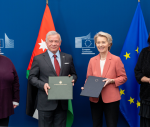You are here
WHO braces for bird flu spread in European poultry, urges vigilance
By AFP - Nov 18,2014 - Last updated at Nov 18,2014

GENEVA — A new kind of bird flu hitting European poultry farms will surely continue to spread among birds, the World Health Organisation said Tuesday, urging countries to be "vigilant".
Whether the virus will spread to humans remains unclear, the UN health agency said.
"We should all be quite vigilant," Elizabeth Mumford, a scientist with the WHO's Global Influenza Programme, told reporters in Geneva.
Responding to questions, she said she "absolutely" expected more bird flocks to fall sick.
She stressed the importance of culling sick birds and monitoring fever in humans who have been in contact with sick birds to ensure any possible human infections are spotted.
Germany and the Netherlands have been confirmed to be dealing with the same subtype of a highly infectious strain of bird flu, called H5N8, which appears to be similar to a virus that has been infecting birds in China, Japan and South Korea since the beginning of the year, she said.
Britain has also been hit with "a highly pathogenic H5 outbreak also in poultry”, Mumford said. It was not yet confirmed, though, that it was the same H5N8 strain.
"It could be something else," she said.
Renowned virologist and bird flu expert Ron Fouchier, however, told AFP Monday that British authorities had told European authorities that their virus was the same H5N8 strain as found in Germany earlier this month and now in the Netherlands.
An EU source told reporters that it is "most likely the same strain in all three places".
Some 150,000 hens at an egg farm near Utrecht in the Netherlands were set to be culled, while 6,000 ducks on a Yorkshire farm in Britain were also to be put down, authorities said.
WHO said the virus had most likely moved from Asia to Europe with migratory wild birds.
Several hundred thousand birds, mainly ducks, have been culled over the last two months because of a South Korean outbreak.
So far, no cases of human infection have been detected, either in Asia or in Europe, Mumford said. She acknowledged though that "influenza viruses are very unpredictable, and it's very difficult to tell what a new virus will do".
"I must say that we really know very little about this virus, and until we get some experience with it, it's a bit wide open."
Since H5N8 seems to be spreading quickly among poultry, "we will probably see some human cases", she told AFP.
But while some people may be infected by sick birds, so far it appeared unlikely that the virus would begin spreading between humans, she added.
The H5 component of the virus appeared similar to that found in the H5N1 strain of bird flu that has killed more than 400 people, mainly in southeast Asia, since first appearing in 2003, Mumford explained.
But the N-component was from a completely different virus with no human component, indicating it really prefers to attach to birds, she said.
The fact that no human cases have surfaced in Asia, where the virus has been circulating for some time, with authorities closely surveilling the situation, "is encouraging", Mumford said.
Another positive fact, she said, was that in lab tests the virus responded to anti-virus drug Tamiflu, meaning if it did jump to humans, the medical community should have a tool to fight it.
In the meantime, WHO is urging people in Europe to avoid touching sick or dead wild birds.
People involved in culling the sick poultry should monitor themselves for fever for two weeks after coming into contact with the birds, Mumford said.
For consumers, she stressed that "poultry meat safely prepared and well-cooked is completely safe”.
Related Articles
Dutch officials were on Monday checking poultry farms for a highly infectious strain of bird flu following outbreaks of similar strains of the virus in Britain and Germany.
AMMAN — Jordan on Tuesday banned the import of frozen poultry and pet birds from Israel, India and five European countries, following the ou
AMMAN — Jordan has banned the import of frozen poultry from Saudi Arabia following the outbreak of a highly pathogenic avian influenza virus


















